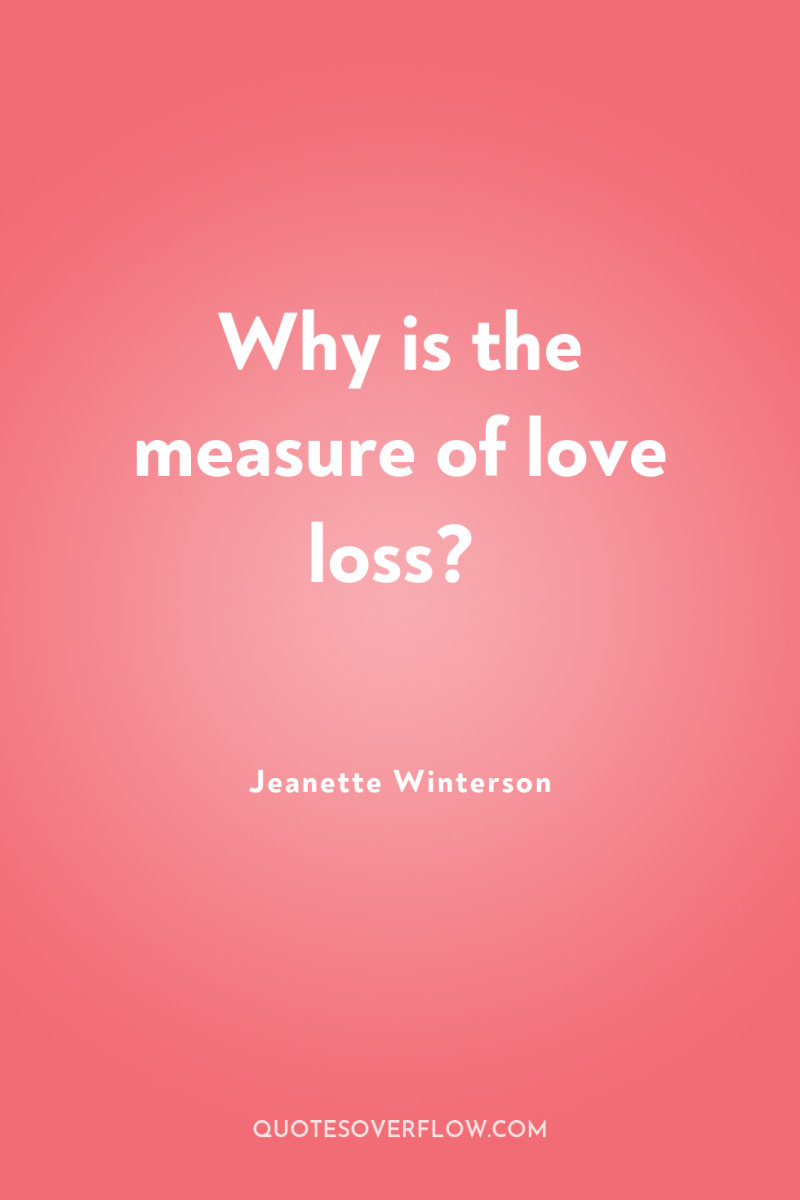
1
Why is the measure of love loss?Jeanette Winterson
2
Truth for anyone is a very complex thing. For a writer, what you leave out says as much as those things you include. What lies beyond the margin of the text? The photographer frames the shot; writers frame their world. Mrs Winterson objected to what I had put in, but it seemed to me that what I had left out was the story’s silent twin. There are so many things that we can’t say, because they are too painful. We hope that the things we can say will soothe the rest, or appease it in some way. Stories are compensatory. The world is unfair, unjust, unknowable, out of control. When we tell a story we exercise control, but in such a way as to leave a gap, an opening. It is a version, but never the final one. And perhaps we hope that the silences will be heard by someone else, and the story can continue, can be retold. When we write we offer the silence as much as the story. Words are the part of silence that can be spoken. Mrs Winterson would have preferred it if I had been silent. Do you remember the story of Philomel who is raped and then has her tongue ripped out by the rapist so that she can never tell? I believe in fiction and the power of stories because that way we speak in tongues. We are not silenced. All of us, when in deep trauma, find we hesitate, we stammer; there are long pauses in our speech. The thing is stuck. We get our language back through the language of others. We can turn to the poem. We can open the book. Somebody has been there for us and deep-dived the words. I needed words because unhappy families are conspiracies of silence. The one who breaks the silence is never forgiven. He or she has to learn to forgive him or herself. .Jeanette Winterson
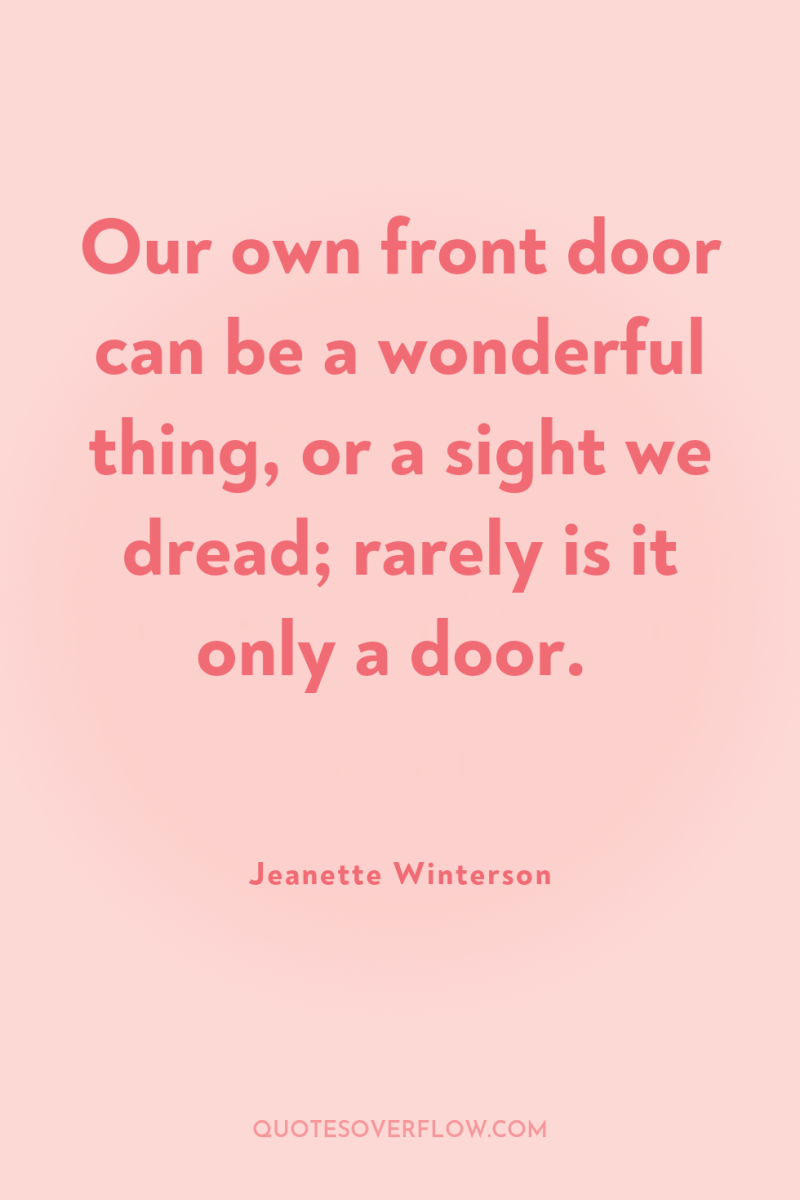
3
Our own front door can be a wonderful thing, or a sight we dread; rarely is it only a door.Jeanette Winterson
4
If the sun is shining, stand in it- yes, yes, yes. Happy times are great, but happy times pass- they have to- because time passes. The pursuit of happiness is more elusive; it is life-long, and it is not goal-centred. What you are pursuing is meaning- a meaningful life.. There are times when it will go so wrong that you will be barely alive, and times when you realise that being barely alive, on your own terms, is better than living a bloated half-life on someone else's terms.Jeanette Winterson
5
I know now, after fifty years, that the finding/losing, forgetting/remembering, leaving/returning, never stops. The whole of life is about another chance, and while we are alive, till the very end, there is always another chance.Jeanette Winterson
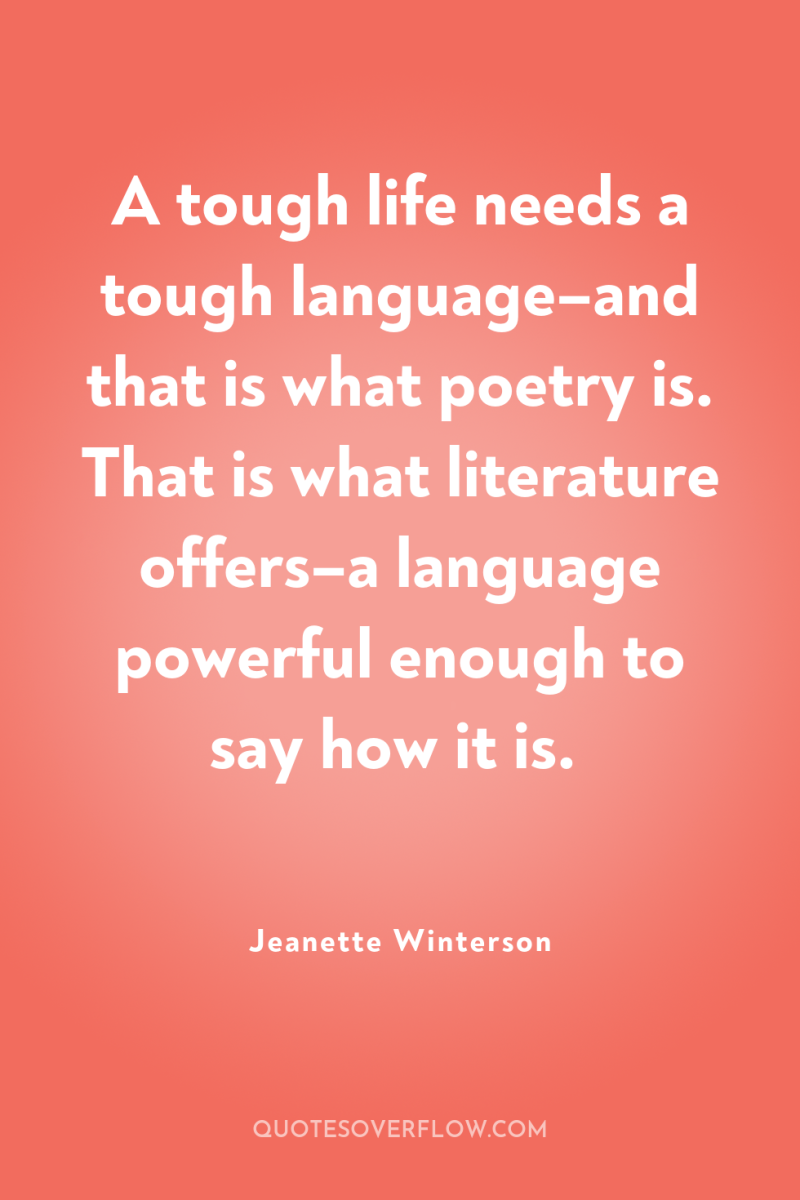
6
A tough life needs a tough language–and that is what poetry is. That is what literature offers–a language powerful enough to say how it is.Jeanette Winterson
7
I believe in fiction and the power of stories because that way we speak in tongues. We are not silenced. All of us, when in deep trauma, find we hesitate, we stammer; there are long pauses in our speech. The thing is stuck. We get our language back through the language of others. We can turn to the poem. We can open the book. Somebody has been there for us and deep-dived the words.Jeanette Winterson
8
I wasn’t reading poetry because my aim was to work my way through English Literature in Prose A—Z.But this was different. I started to cry.(…) The unfamiliar and beautiful play made things bearable that day, and the things it made bearable were another failed family–the first one was not my fault, but all adopted children blame themselves. The second failure was definitely my fault. I was confused about sex and sexuality, and upset about the straightforward practical problems of where to live, what to eat, and how to do my A levels. I had no one to help me, but the T.S. Eliot helped me. So when people say that poetry is a luxury, or an option, or for the educated middle classes, or that it shouldn’t be read at school because it is irrelevant, or any of the strange and stupid things that are said about poetry and its place in our lives, I suspect that the people doing the saying have had things pretty easy. A tough life needs a tough language–and that is what poetry is. That is what literature offers–a language powerful enough to say how it is. It isn’t a hiding place. It is a finding place.Jeanette Winterson
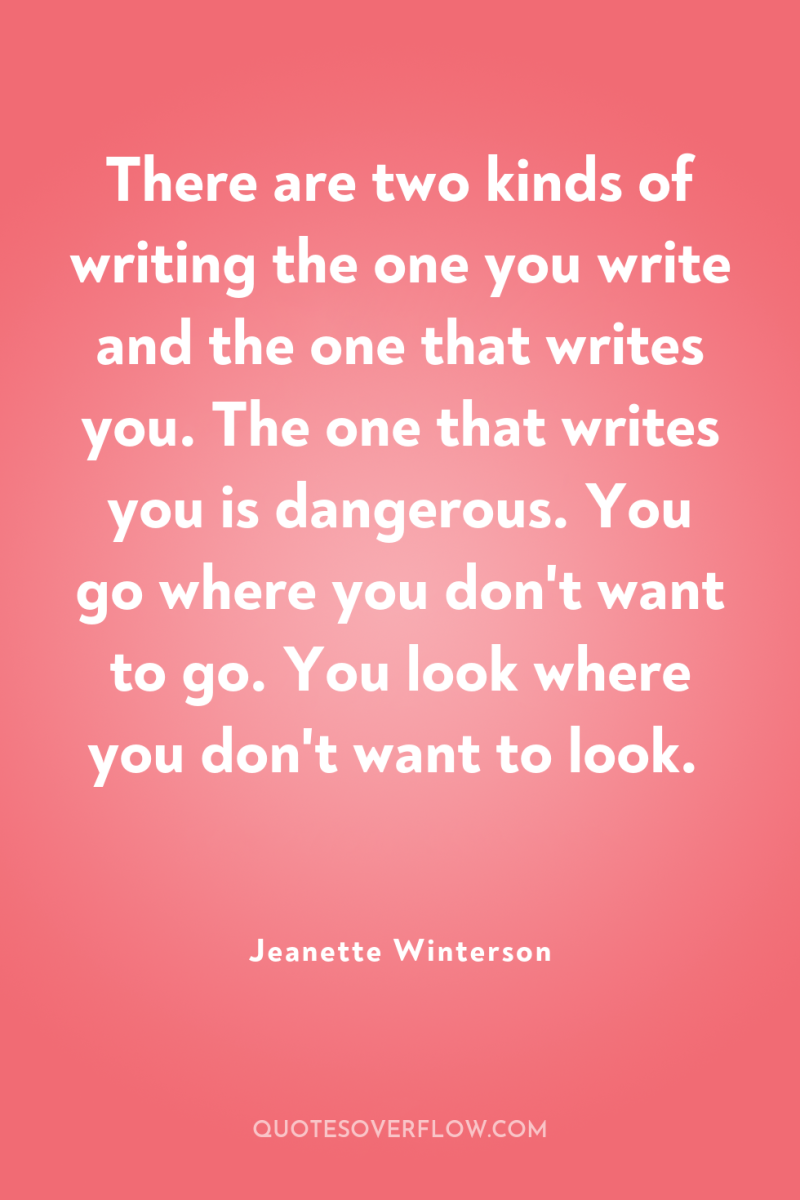
9
There are two kinds of writing the one you write and the one that writes you. The one that writes you is dangerous. You go where you don't want to go. You look where you don't want to look.Jeanette Winterson
10
I had lines inside me, a string of guiding lights. I had language. Fiction and poetry are doses, medicines. What they heal is the rupture reality makes on the imagination. I had been damaged, and a very important part of me had been destroyed - that was my reality, the facts of my life. But on the other side of the facts was who I could be, how I could feel. And as long as I had words for that, images for that, stories for that, then I wasn't lost. .Jeanette Winterson
11
Books, for me, are a home. Books don't make a home - they are one, in the sense that just as you do with a door, you open a book, and you go inside. Inside there is a different kind of time and space. There is warmth there too - a hearth. I sit down with a book and I am warm.Jeanette Winterson
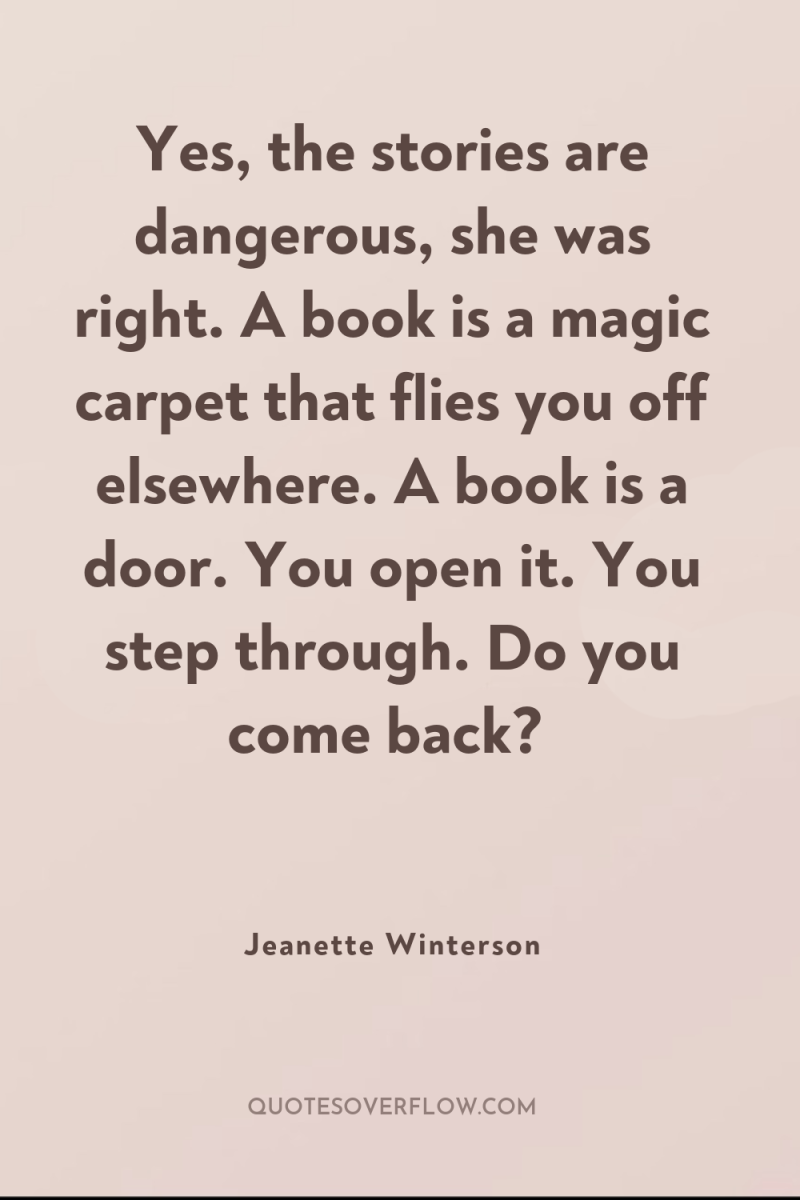
12
Yes, the stories are dangerous, she was right. A book is a magic carpet that flies you off elsewhere. A book is a door. You open it. You step through. Do you come back?Jeanette Winterson
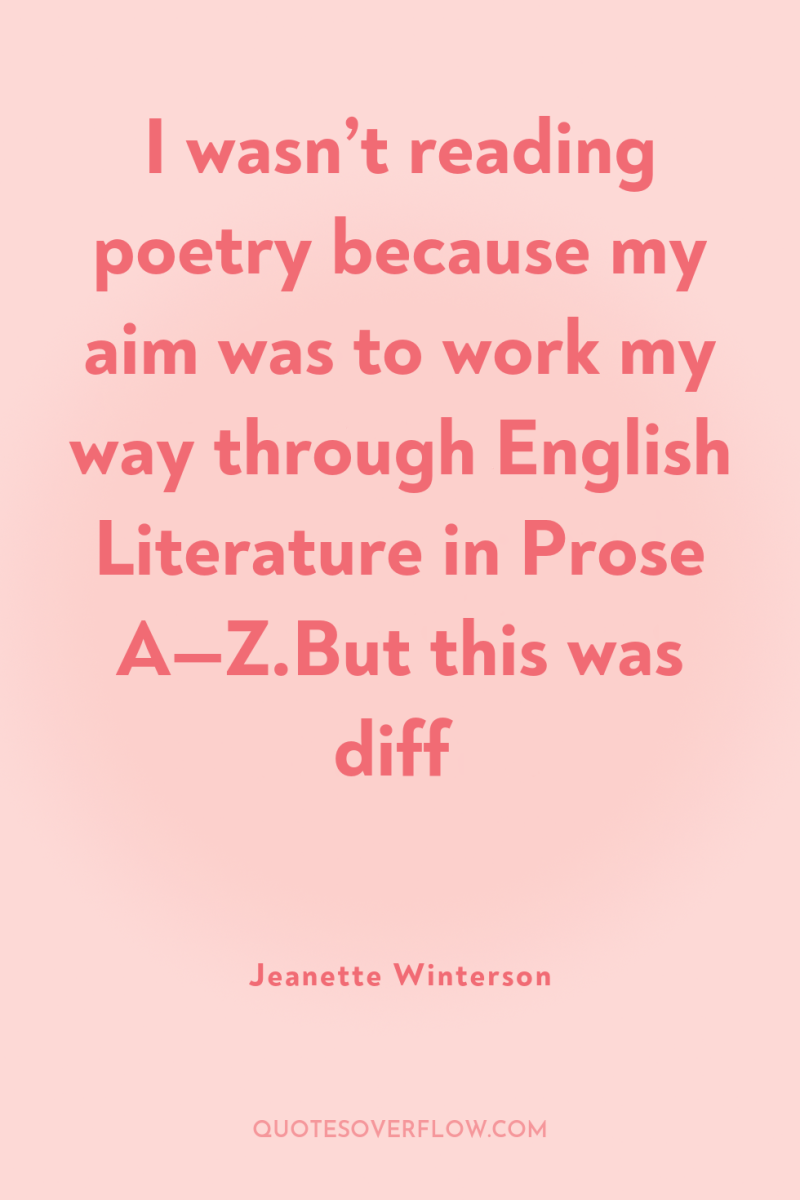
13
I wasn’t reading poetry because my aim was to work my way through English Literature in Prose A—Z.But this was diffJeanette Winterson
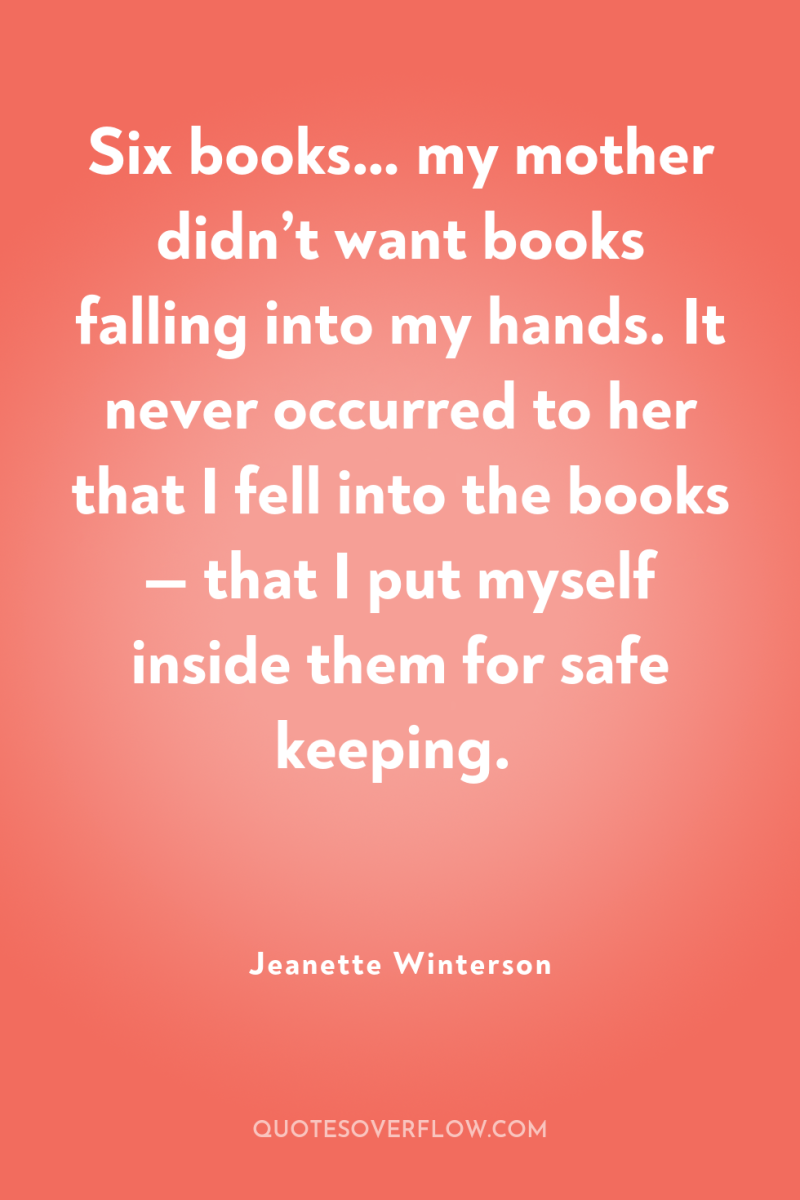
14
Six books… my mother didn’t want books falling into my hands. It never occurred to her that I fell into the books — that I put myself inside them for safe keeping.Jeanette Winterson
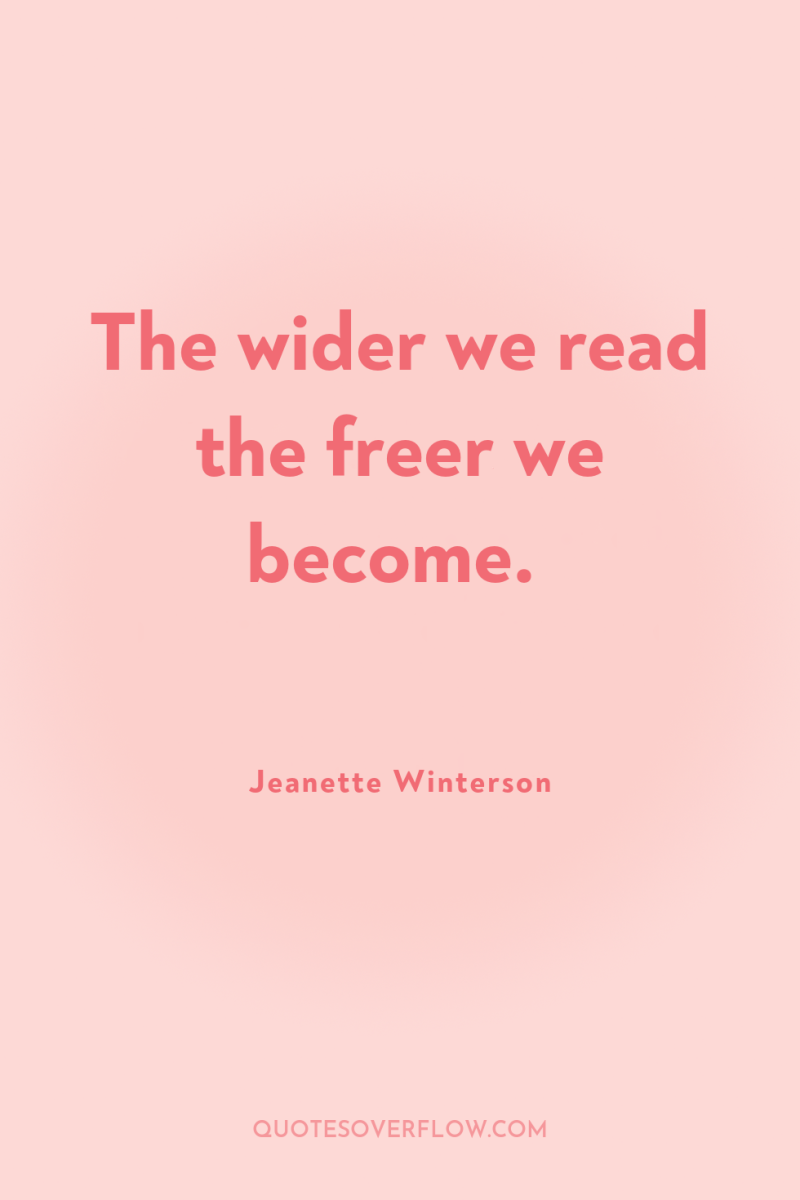
15
The wider we read the freer we become.Jeanette Winterson
16
So when people say that poetry is a luxury, or an option, or for the educated middle classes, or that it shouldn't be read in school because it is irrelevant, or any of the strange and stupid things that are said about poetry and its place in our lives, I suspect that the people doing the saying have had things pretty easy. A tough life needs a tough language - and that is what poetry is. That is what literature offers - a language powerful enough to to say how it is. It isn't a hiding place. It is a finding place.Jeanette Winterson
17
I did not realise that when money becomes the core value, then education drives towards utility or that the life or the mind will not be counted as good unless it produces measurable results. That public services will no longer be important. That an alternative life to getting and spending will become very difficult as cheap housing disappears. That when communities are destroyed only misery and intolerance are left. .Jeanette Winterson
18
Adoption is outside. You act out what it feels like to be the one who doesn't belong. And you act it out by trying to do to others what has been done to you. It is impossible to believe anyone loves you for yourself. I never believed that my parents loved me. I tried to love them but it didn't work. It has taken me a long time to learn how to love - both the giving and the receiving. I have written about love obsessively, forensically, and I know/knew it as the highest value. I loved God of course, in the early days, and God loved me. That was something. And I loved animals and nature. And poetry. People were the problem. How do you love another person? How do you trust another person to love you? I had no idea. I thought that love was loss. Why is the measure of love loss?.Jeanette Winterson
19
She knew full well that writers were sex-crazed bohemians who broke the rules and didn't go out to work.Jeanette Winterson
20
Children do not find fault with their parents until later. In the beginning, the love you get is the love that sets.Jeanette Winterson
21
Reading yourself as a fiction as well as a fact is the only way to keep the narrative open - the only way to stop the story from running away under its own momentum, often towards an ending no one wants.Jeanette Winterson
22
Mrs Ratlow was a widow, and she was head of English, but she still did all the cooking and cleaning for her two sons, and she never took holidays because she said -- and I will never forget it -- "When a woman alone is no longer of any interest to the opposite sex, she is only visible where she has some purpose.Jeanette Winterson
23
And our madness-measure is always changing. Probably we are less tolerant of madness now than at any period in history. There is no place for it. Crucially, there is no time for it. Going mad takes time. Getting sane takes time.Jeanette Winterson
24
He was always a little boy, and I am upset that I didn't look after him, upset there are so many kids who never get looked after, and so they can't grow up. They can get older, but they can't grow up. That takes love. If you are lucky the love will come later. If you are lucky you won't hit love in the face.Jeanette Winterson
25
Only later, much later, too late, did I understand how small she (Mrs Winterson) was to herself. The baby nobody picked up. The uncarried child still inside her.Jeanette Winterson
26
Sometimes you have to live in precarious and temporary places. Unsuitable places. Wrong places. Sometimes the safe place won't help you.Jeanette Winterson
27
Creative work bridges time because the energy of art is not time-bound. If it were we should have no interest in the art of the past, except as history or documentary. But our interest in art is our interest in ourselves both now and always. Here and forever. There is a sense of the human spirit as always existing. This makes our death bearable. Life + art is a boisterous communion/communication with the dead. It is a boxing match with time.Jeanette Winterson
28
Truth for anyone is a very complex thing. For a writer, what you leave out says as much as those things you include. What lies beyond the margin of the text? The photographer frames the shot; writers frame their world.Jeanette Winterson
29
A book is a magic carpet that flies you off somewhere. A book is a door. You open it. You step through. Do you come back?Jeanette Winterson
30
They sounded like intestines, only on the outside, and the men in the Bible were always having them cut off and not being able to go to church. Horrid.Jeanette Winterson
31
Memory loss is one way of coping with damage.Jeanette Winterson
32
In the economy of the body, the limbic highway takes precedence over the neural pathways. We were designed and built to feel, and there is no thought, no state of mind, that is not also a feeling state. Nobody can feel too much, though many of us work very hard at feeling too little. Feeling is frightening.Jeanette Winterson
33
There is still a popular fantasy, long since disproved by both psychoanalysis and science, and never believed by any poet or mystic, that it is possible to have a thought without a feeling. It isn't. When we are objective we are subjective too. When we are neutral we are involved. When we say ‘I think’ we don't leave our emotions outside the door. To tell someone not to be emotional is to tell them to be dead.Jeanette Winterson
34
The past is so hard to shift. It comes with us like a chaperon, standing between us and the newness of the present - the new chance.Jeanette Winterson
35
We heal up through being loved, and through loving others. We don't heal by forming a secret society of one - by assessing about the only other 'one' we might admit, and being doomed to disappointment.Jeanette Winterson
36
Part fact part fiction is what life is. And it is always a cover story. I wrote my way out.Jeanette Winterson
37
Living with life is very hard. Mostly we do our best to stifle life - to be tame or to be wanton. to be tranquillised or raging. Extremes have the same effect; they insulate us from the intensity of life. And extremes - whether of dullness or fury - successfully prevent feeling. I know our feelings can be so unbearable that we employ ingenious strategies - unconscious strategies- to keep those feelings away. We do a feelings-swap, where we avoid feeling sad or lonely or afraid or inadequate, and feel angry instead. It can work the other way, too - sometimes you do need to feel angry, not inadequate; sometimes you do need to feel love and acceptance, and not the tragic drama of your life. It takes courage to feel the feeling - and not trade it on the feelings-exchange, or even transfer it altogether to another person. You know how in couples one person is always doing all the weeping or the raging while the other one seems so calm and reasonable? I understood that feelings were difficult for me although I was overwhelmed by them. .Jeanette Winterson
38
To tell someone not to be emotional is to tell them to be dead.Jeanette Winterson
39
You cannot disown what is yours. Flung out, there is always the return, the reckoning, the revenge, perhaps the reconciliation. There is always the return. And the wound will take you there.Jeanette Winterson
40
We bury things so deep we no longer remember there was anything to bury. Our bodies remember. Our neurotic states remember. But we don't.Jeanette Winterson
41
...there are two kinds of writing: the one you write and the one that writes you.Jeanette Winterson
42
Where you are born--what you are born into, the place, the history of the place, how that history mates with your own-- stamps who you are, whatever the pundits of globalisation have to say.Jeanette Winterson
43
When you are born--what you are born into, the place, the history of the place, how that history mates with your own-- stamps who you are, whatever the pundits of globalisation have to say.Jeanette Winterson
44
Unconditional love is what a child should expect from a parent even though it rarely works out that way.Jeanette Winterson
45
She had other favourite lines. Our gas oven blew up. The repairman came out and said he didn't like the look of it, which was unsurprising as the oven and the wall were black. Mrs Winterson replied, 'It's a fault to heaven, a fault against the dead, and a fault to nature.' That is a heavy load for a gas oven to bear. She liked that phrase and it was more than once used towards me; when some well-wisher asked how I was, Mrs W looked down and sighed, 'She's a fault to heaven, a fault against the dead, and a fault to nature.' This was even worse for me than it had been for the gas oven. I was particularly worried about the 'dead' part, and wondered which buried and unfortunate relative I had so offended.Jeanette Winterson
46
Even now when I'm furious, what I would like to do is to punch the infuriating person flat on the ground. That solves nothing I know, and I spent a lot of time understanding my own violence, which is not of the pussycat kind. There are people who could never commit murder; I am not one of those people. It's better to know it, better to know who you are, and what lies in you, and what you could do, might do, under extreme provocation. .Jeanette Winterson
47
Our contradictions are never so to ourselves.Jeanette Winterson
48
Growing up is difficult. Strangely, even when we have stopped growing physically, we seem to have to keep on growing emotionally, which involves both expansion and shrinkage, as some parts of us develop and others must be allowed to disappear... Rigidity never works; we end up being the wrong size for our world.Jeanette Winterson
49
I was sixteen and my mother was about to throw me out of the house forever, for breaking a very big rule, even bigger than the forbidden books. The rule was not just No Sex, but definitely No Sex With Your Own Sex.Jeanette Winterson
50
She hated being a nobody and like all children, adopted or not, I have had to live out some of her unlived life. We do that for our parents - we don't really have any choice.Jeanette Winterson